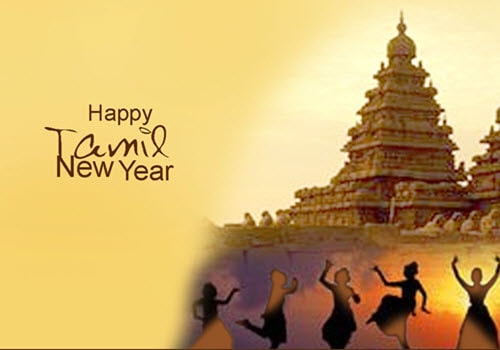
Tamil New Year
Tamil Puthandu, also known as Puthuvarusham or Tamil New Year, is the first day of the year on the Tamil calendar. The festival date is set with the solar cycle of the lunisolar Hindu calendar, as the first day of the Tamil month Chithirai. The traditional new year in April with the first financial transaction. It therefore almost always falls on or about 14 April every year on the Gregorian calendar. The same day is observed by Hindus elsewhere as the traditional new year but is known by other names such as Vishu in Kerala, and Baisakhi in central and north India.
On this day, Tamil people greet each other by saying "Puttandu valttukkal!" or "Iniya puttantu nalvalthukkal!", which is equivalent to "Happy new year". The day is observed as family time. Households clean up the house, prepare a tray with fruits, flowers, and auspicious items, light up the family Puja altar and visit their local temples. People wear new clothes and youngsters go to elders to pay respects and seek their blessings, then the family sits down to a vegetarian feast.
Puthandu is also celebrated by Tamil outside Tamil Nadu and Puducherry, such as in Sri Lanka, Malaysia, Singapore, Reunion, Mauritius, and other countries with Tamil Diaspora.
Celebration
On the eve of Puthandu, a tray is arranged with three fruits (mango, banana, and jack fruit), betel leaves and areca nut, gold/silver jewelry, coins/money, flowers, and a mirror. This is similar to Vishu new year festival ceremonial tray in Kerala. According to the Tamil tradition, this festive tray is auspicious as the first sight upon waking on the new year's day. The home entrances are decorated elaborately with colored rice powder and these designs are called kolams.
In the temple city of Madurai, the Chitterai Thiruvizha is celebrated in the Meenakshi Temple. A huge exhibition is held, called Chitterai Porutkaatchi. On the day of Tamil New Year, a big Car Festival is held at Tiruvidaimarudur near Kumbakonam. Festivals are also held at Tiruchirapalli, Kanchipuram, and many other places.
Sri Lankan Tamils observe the traditional new year in April with the first financial transaction known as the 'Kai-vishesham' where youngsters go to elders paying their respect, and elders give their blessings and gift pocket money to them. The event is also observed with the 'arpudu' or the first plowing of the ground to prepare for the new agricultural cycle. The game of 'porthenkai' or coconut wars between youth is played in villages through the Tamil north and east of the island while cart races are also held. The festive Puthandu season in April is a time for family visits and the renewal of filial bonds. It coincides with the Sinhalese new year season.
Later in the day, families enjoy a feast. A special dish called Mangai-pachadi is prepared from a variety of flavors, similar to pacchadi of new year foods of Ugadi and Vishu. It is made from sweet jaggery, astringent mustard, sour raw mango, bitter neem, and red chilies. This complex dish is ritually tasted by Tamils, as similar multi-flavors are by Hindus elsewhere on the new year. Such traditional festive recipes, that combine different flavors, are a symbolic reminder that one must expect all flavors of experiences in the coming new year, that no event or episode is wholly sweet or bitter, experiences are transitory and ephemeral, and to make the most from them.
In Malaysia and Singapore, Tamils join Sikhs, Malayalees, and Bengalis to celebrate the traditional new year in mid-April with leaders across the political spectrum wishing the ethnic Indian community for the new year. Special religious events are held in Hindu temples, in Tamil community centers, and in Gurdwaras. Cultural programs and media events also take place. It's a day of celebration for the Indian community.
